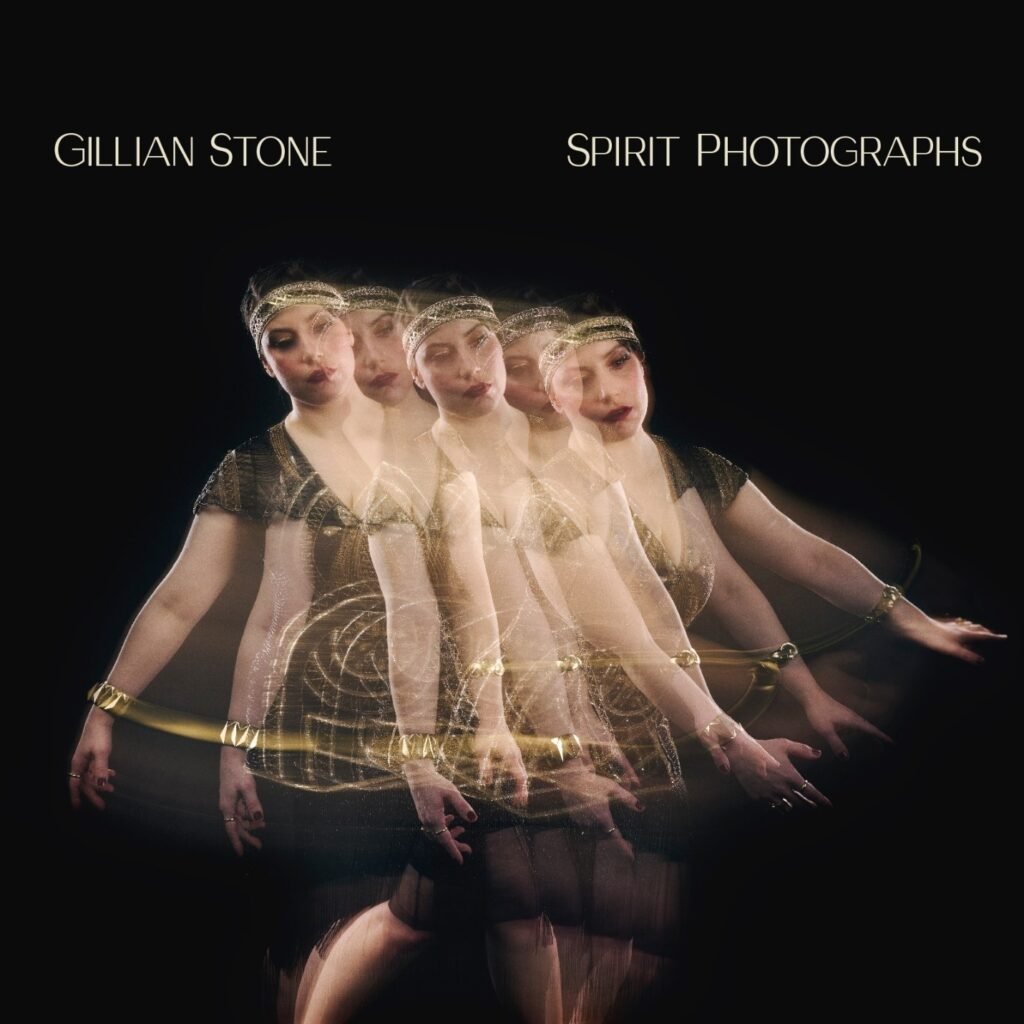Multi-instrumentalist, ethnomusicologist, and multidisciplinary artist Gillian Stone works in Toronto (Tkaronto). She has been praised for her vocal-driven music, which has been called “beyond characterization” and “surreal in its composition” and draws inspiration from post-rock, folk, ambience, and minimalism (The Revue). Stone channels the influence of outer landscapes in her inner lyrical worlds and soundscapes. She was born and raised on the traditional territory of the Quw’utsun on Vancouver Island and has a strong connection to her Icelandic heritage. She explores mental health through her music, focusing on dysregulation, addiction, shame, relational trauma, and dissociation. As a destigmatization strategy, she speaks openly about her personal experience through her music and artistic expressions.
Grief is the subject of the post-rock/drone folk concept album Spirit Photographs. Denial (“June”), rage (“Amends”), bargaining (“Raven’s Song”), depression (“Solitude,” a Black Sabbath cover from the seminal Master of Reality), and acceptance (“The Throne”) are the five songs that each represent one of Elisabeth Kübler-Ross’ stages. She investigates how to process her own mental health disability in a time of widespread trauma using this model. Spirit Photographs responds to and challenges the post-rock landscape by being vocally and emotionally driven in a world where the genre is heavily influenced by men and instrumental music. Check out the EP and the exclusive interview below:

1. Can you tell us a bit about where you come from and how it all got started?
GILLIAN STONE: While I’m currently based in Toronto, Canada, and have been for ten years, I’m originally from Vancouver Island and lived there until I was in my mid-twenties. Music was always something I dabbled with throughout my early childhood. Writing was actually my first creative love, and I would spend hours writing fiction and poetry. For that reason, lyrics are incredibly important to me. When I was in my early teens, I started taking classical voice lessons, and that’s when music started sharing a front seat with writing for me.
2. Did you have any formal training or are you self-taught?
GILLIAN STONE: I have quite a bit of formal training, although for me it’s been a study of technique and sound. In other words, I don’t believe that formal training takes the cake – some of the best song writers and musicians are self-taught. As mentioned above, I studied classical voice throughout my teen years, along with rock guitar and bass lessons – quite the dichotomy. I then did an undergraduate degree in jazz studies where my primary instrument was voice, followed by a master’s degree in ethnomusicology. The ethno was a real ego-buster – with the classical and jazz background I thought I was well rounded, but then learning music from other cultures made me realize how little I actually knew. As with anything in life, the more you know, the more you realize you don’t know.
3. Who were your first and strongest musical influences and why the name ‘GILLIAN STONE’?
GILLIAN STONE: The album that completely changed my musical life was Tool’s Lateralus, which I discovered at 15. Being from I small town on Vancouver Island, there wasn’t a lot for me to discover live, so I relied heavily on FM radio. I remember hearing the radio edit “Schism” and being intrigued. I bought the CD in December 2001, listened to it alone in my room in the dark, and it completely blew my mind. After that it was the only thing I listened to for six months. For me, Tool was the gateway to psychedelic and prog rock, ambient and drone, art rock, metal – pretty much everything I’m into now.
And I chose to perform under my own name because my music is a reflection of me. I perform different parts of myself, examine those parts, and sometimes inflate them into characters. But it’s all me – it’s all my big emotions.
4. What do you feel are the key elements in your music that should resonate with listeners, and how would you personally describe your sound?
GILLIAN STONE: Vulnerability is a key element in my music that I hope resonates with listeners. I suppose exploration and genre-bending are also key elements of the sonic environment I work to create. I’m usually not intentionally doing this, it’s just what authentically comes out of me. This can be a bit isolating because, as an artist, I don’t fit neatly into any boxes. However, the people that my work does resonate with are so wonderfully supportive. As for how I would personally describe my sound, I usually call it “vocally-driven post-rock/drone folk”.

5. For most artists, originality is first preceded by a phase of learning and, often, emulating others. What was this like for you? How would you describe your own development as an artist and music maker, and the transition towards your own style, which is known as INDIE?
GILLIAN STONE:
This is a good question. My development as an artist and music maker took a long time. I’ve been working in music for twenty years and have been writing music for about as long. I’ve always fundamentally been a folk artist, but it never felt quite right performing acoustically. I’m also terrible at writing pop songs, so I had to find my own way. Once I got an electric guitar and started getting into effects, I started to find my own voice. That was only a few years ago – I didn’t properly release my first single until late 2020. So I’m definitely a late bloomer in regards to my creative development.
6. What’s your view on the role and function of music as political, cultural, spiritual, and/or social vehicles – and do you try and affront any of these themes in your work, or are you purely interested in music as an expression of technical artistry, personal narrative, and entertainment?
GILLIAN STONE:
Having been drawn to study ethnomusicology, I absolutely believe music serves as a vehicle for sociology, politics, spirituality, and culture in such a vast way. This is something that will forever fascinate me. In my work, I try to draw certain themes out of my personal narrative. Mental health, particularly addiction, features prominently in my lyrics and soundscapes. There is so much shame surrounding the messiness of addiction, of letting that part of it be seen. So many public addiction narratives are about overcoming and triumph. My music is often about expressing uncomfortable feelings in order to combat fear and shame. Whether or not this affronts larger, more universal themes, I’m not sure. It’s my story, and if it helps anyone in the recovery community, then it’s serving its purpose.
7. Do you feel that your music is giving you back just as much fulfillment as the amount of work you are putting into it or are you expecting something more, or different in the future?
GILLIAN STONE:
It’s a tough business, that’s for sure. Financially, frankly, no. But spiritually, yes. Having not had the emotional and financial resources to pursue my solo project the way I wanted to until recently, I can say that being able to work on music in a way that feels meaningful has brought so much fulfillment into my life. As for the future, I want to keep creating and evolving. When I was in grad school, one of my favorite academic texts was ‘Rock On’: Women, Ageing and Popular Music by Abigail Gardner. A part that really stuck out to me was the notion that, in western culture, women are considered to have aesthetically and commercially peaked at age 23 in the music industry. I say fuck that shit. I can’t wait to be old and unfuckable and continuing to make weird music.
8. Creative work in a studio or home environment, or interaction with a live audience? Which of these two options excites you most, and why?
GILLIAN STONE:
I am partial to creating in a studio. I tend to hear entire soundscapes around my songs when I write them, and realizing them in a controlled environment is preferable for me. I love manipulating parts, sounds, and textures. I also struggle with performance anxiety as an extension of my social anxiety disorder, although that is slowly getting better with each show I play. Spirit Photographs came together as a studio album, due in part to the pandemic, but also due to my psychosocial discomfort.
9. What has been the most difficult thing you’ve had to endure in your life or music career so far?
GILLIAN STONE: The cycle of trauma, mental health, and addiction has been the most difficult thing I’ve endured in both life and my music career. It was only when I started to begin the process of healing that I could focus productively on my creative work. Healing is truly my life’s work – choosing life and striving to thrive. Creating is imperative to my healing process and spiritual development, which is why I will be in it for life.
10. On the contrary, what would you consider a successful, proud or significant point in your life or music career so far?
GILLIAN STONE: Releasing Spirit Photographs is very significant for me. It’s a cumulation of years of hard work, seeing it from start to finish. It feels so special to be able to release it on vinyl, to have something physical that represents the journey. I suspect that every artist is striving to create art that they themselves would want to consume. Spirit Photographs feels that way to me. It is work that is solidly based in my integrity, and I consider that to be a success.
KEEP IN TOUCH:
FACEBOOK | INSTAGRAM | SPOTIFY | BANDCAMP | WEBSITE | YOUTUBE

Photo credits: Joel Gale
